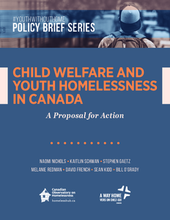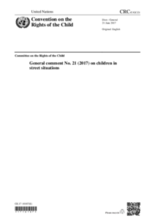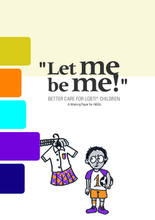Displaying 61 - 70 of 228
A recent Canadian study on youth homelessness revealed that youth experiencing homelessness are 193 times more likely to report interactions with the child welfare system. This policy brief offers a snapshot of the situation for homeless youth with experience in care, an analysis of the structures and systems leaving these children behind, and recommendations for policy and practice.
This chapter explores how the failing system of traditional almajiri education, challenges associated with government efforts to integrate almajiri education into the formal school system, social exclusion and hostility contribute to increase the boys’ vulnerability to radicalisation and recruitment by Boko Haram.
This study investigated the incidence of maltreatment experienced by children living outside parental care, comparing the prevalence of abuse between children living with extended family, children living in institutional care, and children living or working on the street.
This country care review includes the care-related Concluding Observations adopted by the Committee on the Rights of the Child during the seventy-fifth session (15 May 2017 - 2 Jun 2017) of the Convention on the Rights of the Child.
This country care review includes the care-related Concluding Observations adopted by the Committee on the Rights of the Child during the seventy-fifth session (15 May 2017 - 2 Jun 2017) of the Convention on the Rights of the Child.
This country care review includes the care-related Concluding Observations adopted by the Committee on the Rights of the Child during the seventy-fifth session (15 May 2017 - 2 Jun 2017) of the Convention on the Rights of the Child.
General Comment 21, issued by the Committee on the Rights of the Child, provides guidance to States on developing comprehensive, long-term national strategies on children in street situations, utilizing a child rights approach and addressing both prevention and response in line with the Convention on the Rights of the Child.
This cross-sectional descriptive study found that poverty is the main reason children stay and work on the street.
Dreilinden produced this working paper to improve practice in the area of *LGBTI children in care. This paper has texts in a variety of formats from around the world and contains three sections that cover research and tools, interviews, and practice examples.
In order to better serve youth trafficking victims, this study developed a Human Trafficking Screening Tool (HTST) and pretested it with 617 runaway and homeless youth and child welfare-involved youth.








